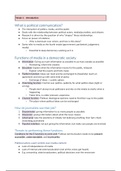Week 1 - Introduction
What is political communication?
● The interaction of politics, media, and the public
● Deals with the relationship between political actors, media/journalists, and citizens
● Research is driven by the question of who "shapes" these relationships
● Focus on power of relations
○ Who is dominant over whom, and how is this done?
● Some refer to media as the fourth estate (government, parliament, judgement,
media)
○ Essential to keep democracy working as it is
Functions of media in a democratic society
● Information: Giving as much information as possible to as many people as possible
○ Monitoring, inform the citizens
● Education: Explain what the information means for the public, interpret
○ Explain what the events and facts mean
● Platform function: Ideas can meet and be exchanged to (hopefully) reach an
agreement and end up with some kind of policy
○ Exchange of ideas → public sphere
● Watchdog function: Control over politics, publicity for what politics does (right or
wrong)
○ People don't always trust politicians and rely on the media to clarify what is
happening
○ Takes time, is under pressure, expensive
● Channel function: Political, ideological opinions need to find their way to the public
○ The place where political ideas can be exchanged
How do journalists see their job?
1. Disseminator: giving information to as many people as possible
2. Interpreter: giving information about what the news m eans
3. Adversarial: take the positions of initially not believing anything, then fact-check
(watchdog journalism)
4. Populist mobilizer: not just giving the information, but make sure people are involved
Threats to performing these functions
Conditions for the 5 functions to work well: Political communication needs to be p
resent,
accessible, u
nderstandable, and trustworthy
Political actors want control over media content
● Lack of independence of media
● Lack of internal and external pluralism (not all the voices get heard)
● E.g. censorship, state broadcasters, political decisions over the newsroom
,Commercialization
● Leads to decreased news quality
● About attracting an audience as large as possible
● Leads to the inclusion of sensational elements in the news
○ Not necessarily more informative
● Elements of entertainment enter the news
● Not much room for political news → incomplete overview for the public
○ Do we want a full overview?
○ Full news standard: Give the public all the information
■ Not realistic but can still be a starting point
● Burglar alarm standard: Give the public information only when it is needed
○ Media determine what is really important
○ Criticism: media gets a lot of power, burglar alarm all the time, so people
don't see it, becomes irrelevant, we become used to it
● Information abundance is partly misleading
● 95% of the news is from traditional media
Information processing by the public
● Audience not being able to process the information or distinguish news from
misinformation
● Videomalaise (Robinson, 1975): watching TV has a negative effect on people
○ Cynicism, low trust in political institutions, low sense of political efficacy
○ People don’t feel that they can understand politics and do something
themselves
● Dumbing down: People feel that they can't / don’t want to understand the news
○ Less willingness to process political information
● Criticism to mediamalaise theory: There are some positive effects of media content
○ Some elements can be good to reach more people (e.g. sensational elements)
○ Journalists should focus on the audience as citizens and try to address them
all
Evolution of political communication
● Evolutions go together with larger societal trends
○ Individualization, depolarization, the crisis of parties, increased voter volatility,
commercialization, etc.
● It is a process (or several processes)
A four-dimensional
conceptualization of the
mediatization of politics
, 4 phases of mediatization
PHASE 1
● Mediation: media become the main communication channel between politics and the
public
PHASE 2
● Media become more independent
● Higher journalistic professionalism
● Political system still had the upper hand
● Media do not mediate messages unconditionally anymore
PHASE 3
● Media become so independent that other actors have to adapt to them
● Media has the upper hand (but are still external to the political system)
● Politicians have to increase the skill to do this adaptation of the media logic
○ Following the format, content, grammar, and rhythm of the media
○ Especially in campaigns
PHASE 4
● Politics adopt the media logic
● Standards of media logic become part of governing processes
● Media are no longer external
● Politicians who need to answer to people are most affected
○ Media are basically colonizing politics
○ Not all countries are in this fourth phase
○ Don't really want the fourth phase
Karidi indicators of evolution in the commercial news media logic
These have increased over 30 years for quality news media (in the German context)
● Celebrities
● Conflict
● Emotionalization
● Media pundits (opinions by experts)
● Negativity
● Opinions and narrative stories
● Personalization
● Scandals
● Soft news
Some nuances
● Media are not a global or unidirectional trend
● Media will not take over political functions
● Moderation of mediatization, depending on the political system, media system,
strength of parties, etc.
● But on social media, many politicians follow this commercial media logic




